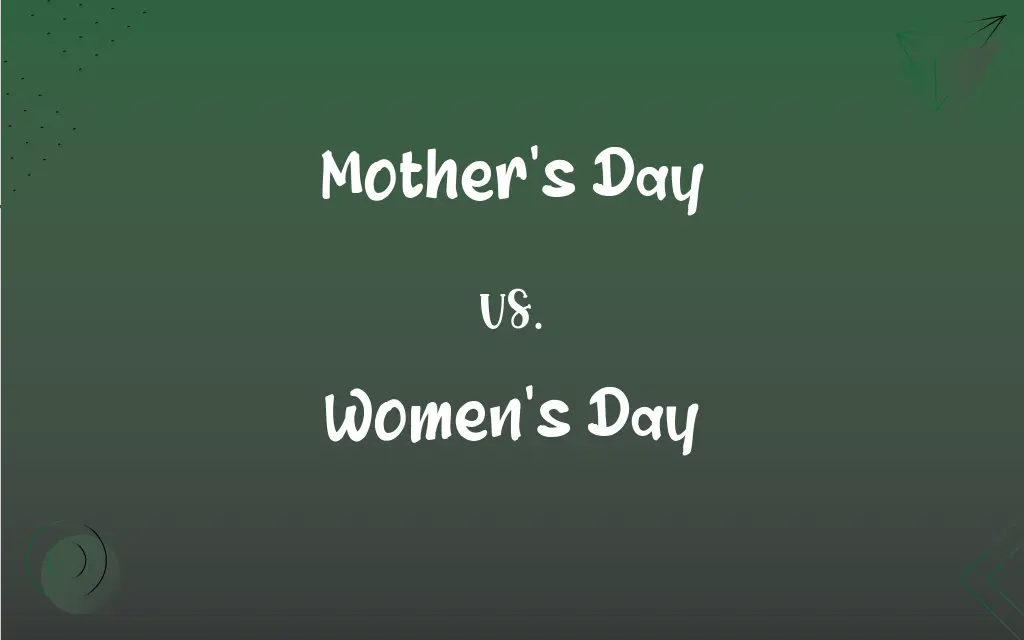Mother’s Day vs. Women’s Day: What's the Difference?
Edited by Aimie Carlson || By Janet White || Updated on November 21, 2023
Mother's Day is a celebration honoring mothers and maternal bonds, typically observed in May, while International Women's Day, observed on March 8, celebrates the social, economic, cultural, and political achievements of women.

Key Differences
Mother's Day is a day dedicated to honoring and appreciating mothers and motherhood, traditionally involving giving gifts, cards, and spending time with one's mother. International Women's Day is a global day celebrating the achievements of women in various fields and promoting gender equality and women's rights. Both days recognize and honor the contributions of women, but in different contexts and scopes.
International Women's Day is marked by events worldwide, including marches, talks, and campaigns, focusing on issues like gender equality, women's rights, and advocacy against gender-based violence. On Mother's Day, the focus is more personal and family-oriented, often celebrated at home or in intimate settings, emphasizing the appreciation of individual mothers and mother figures. Each day has its unique significance, with Mother's Day focusing on personal gratitude and Women's Day emphasizing broader societal and global issues.
Mother's Day originated in the United States in the early 20th century and has become a widely recognized holiday in many countries, with variations in the date and traditions based on local cultures. International Women's Day, first observed in 1911, has its roots in the labor movements and suffrage movements of the early 20th century, aiming to bring attention to issues affecting women globally. The historical origins of each day reflect their different purposes, with Mother's Day centered on family and personal relationships and Women's Day focused on wider social and political themes.
In terms of themes, Mother's Day is often associated with familial love, appreciation, and personal acknowledgment, while International Women's Day is linked to themes of empowerment, solidarity, and advocacy for women's rights. While both days celebrate women, the approach and focus of Mother's Day are more individual and familial, whereas Women's Day has a more collective and activist orientation.
Mother's Day is typically a more commercialized holiday, with a significant focus on buying gifts, flowers, and cards for mothers, while International Women's Day often involves activism, awareness campaigns, and educational events. The commercial aspect of Mother's Day contrasts with the political and social activism often seen on Women's Day, highlighting their different purposes and modes of observance.
ADVERTISEMENT
Comparison Chart
Focus
Honoring mothers and maternal bonds
Celebrating women's achievements and advocating for rights
Date
Varies, commonly second Sunday in May
March 8th annually
Origins
Early 20th century USA
Early 20th century labor and suffrage movements
Celebrations
Gifts, family gatherings, personal appreciation
Marches, campaigns, global awareness
Themes
Familial love, appreciation
Empowerment, equality, global issues
ADVERTISEMENT
Mother's Day and Women's Day Definitions
Mother's Day
Can include honoring all mother figures, including grandmothers and stepmothers.
We send Mother's Day cards to all the important women in our lives.
Women's Day
Includes events like marches, speeches, and discussions on women's rights.
The Women's Day march drew a large crowd advocating for equal rights.
Mother's Day
A day to celebrate and honor mothers and motherhood.
We're planning a special brunch for Mother's Day.
Women's Day
Observed annually on March 8th.
International Women's Day falls on March 8th every year.
Mother's Day
Celebrated in many countries, though dates can vary.
In the U.S., Mother's Day is observed on the second Sunday in May.
Women's Day
A global day celebrating women's achievements and advocating for gender equality.
On Women's Day, we attended a seminar on women's leadership.
Mother's Day
A time for families to show appreciation for their mothers.
On Mother's Day, we always make breakfast in bed for Mom.
Women's Day
Recognizes the social, economic, cultural, and political contributions of women.
Many businesses offer promotions for women on Women's Day.
Mother's Day
Often involves giving gifts and cards to mothers.
I bought a beautiful bouquet for my mom on Mother's Day.
Women's Day
Aims to raise awareness about issues such as gender equality and violence against women.
This Women's Day, the focus was on ending domestic violence.
FAQs
Can Mother's Day be celebrated for non-biological mothers?
Yes, Mother's Day honors all mother figures, including adoptive, step, and foster mothers.
When is Mother's Day celebrated?
Mother's Day is typically celebrated on the second Sunday in May in many countries.
What are common gifts on Mother's Day?
Common Mother's Day gifts include flowers, cards, jewelry, and meals.
Why is Women's Day important?
Women's Day is important for recognizing women's contributions and advocating for women's rights and issues.
How did Mother's Day originate?
Mother's Day originated in the early 20th century in the United States as a day to honor mothers.
Is Mother's Day the same date worldwide?
No, Mother's Day dates vary globally, with many countries observing it in May, but others on different dates.
What is the significance of International Women's Day?
International Women's Day celebrates women's achievements and promotes gender equality.
Are there specific colors associated with Women's Day?
Purple is often associated with Women's Day, symbolizing justice and dignity.
How is Women's Day celebrated globally?
Women's Day is celebrated with marches, discussions, and events focusing on women's rights and achievements.
Is Mother's Day a public holiday?
Mother's Day is not a public holiday in most countries, but it is widely observed.
How can men participate in Women's Day?
Men can participate by supporting women's rights, attending events, and promoting gender equality.
What are the themes of International Women's Day?
Themes include gender equality, women's empowerment, and ending violence against women.
What is the historical significance of Women's Day?
Women's Day has its roots in the early 20th century labor and suffrage movements.
What kind of events occur on Women's Day?
Events include workshops, conferences, cultural performances, and rallies.
Can Mother's Day be celebrated for grandmothers?
Yes, Mother's Day is also an opportunity to honor and appreciate grandmothers.
Are restaurants usually busy on Mother's Day?
Yes, dining out is a popular way to celebrate Mother's Day, making restaurants busier than usual.
How can children celebrate Mother's Day?
Children can celebrate Mother's Day with homemade cards, gifts, and spending quality time with their mothers.
Does Women's Day have an official symbol?
There's no official symbol, but the Venus symbol (♀) is commonly used to represent women.
How can one support Women's Day?
Supporting Women's Day can include attending events, advocating for women's issues, and educating oneself on gender equality.
Is Mother's Day commercialized?
Yes, Mother's Day has become quite commercialized, with significant marketing around gift-giving and celebrations.
About Author
Written by
Janet WhiteJanet White has been an esteemed writer and blogger for Difference Wiki. Holding a Master's degree in Science and Medical Journalism from the prestigious Boston University, she has consistently demonstrated her expertise and passion for her field. When she's not immersed in her work, Janet relishes her time exercising, delving into a good book, and cherishing moments with friends and family.
Edited by
Aimie CarlsonAimie Carlson, holding a master's degree in English literature, is a fervent English language enthusiast. She lends her writing talents to Difference Wiki, a prominent website that specializes in comparisons, offering readers insightful analyses that both captivate and inform.






































































